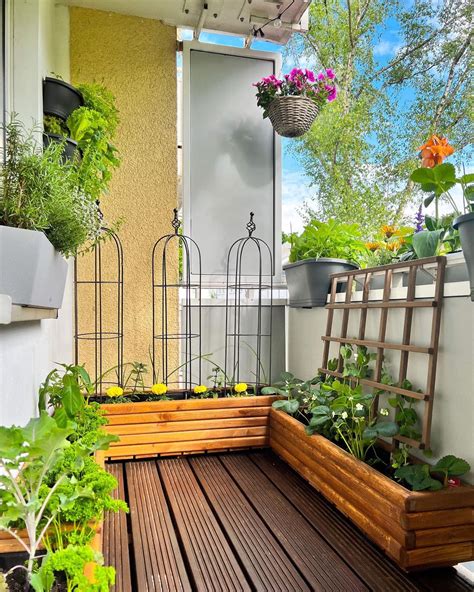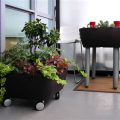Essential Tips for Planning a Year-Round Balcony Garden
Balcony gardening has gained popularity as an excellent solution for urban dwellers who want to enjoy fresh plants all year. However, creating a year-round balcony garden that thrives requires thoughtful planning, attention to the changing seasons, and understanding the unique challenges of gardening in containers. This article will cover key concepts, practical tips, and considerations for designing a resilient, all-season balcony garden. Whether you are new to gardening or a seasoned green thumb, this guide will help you make the most of your limited space and cultivate plants throughout the year.
Key Concepts for a Year-Round Balcony Garden
- Seasonal Planning: A well-designed garden accounts for changes in temperature, sunlight, and plant needs throughout the year.
- Container Gardening: Since space is limited, containers provide flexibility and portability. Choose the right size, material, and drainage.
- Sunlight Management: Understanding your balcony’s sun exposure helps in selecting appropriate plants for different seasons.
- Plant Selection: Choose plants that thrive in varying conditions, and focus on perennials, evergreens, and annuals for continuous growth.
- Watering and Maintenance: A consistent watering schedule is key for container gardens. Adjust for seasons and weather.
Historical Context: The Rise of Balcony Gardens
Urbanization has significantly reduced the availability of green spaces, prompting people to turn balconies, terraces, and rooftops into personal gardens. Historically, container gardening dates back to ancient civilizations, where small-scale gardens were cultivated on rooftops and terraces for food and aesthetics. Over time, balcony gardens have evolved into sophisticated, eco-friendly solutions to promote sustainability in densely populated areas.
Current State of Balcony Gardening
Today, balcony gardens serve multiple purposes, from food production and aesthetic value to promoting mental well-being. With innovations in container technology, vertical gardening, and compact plant varieties, gardeners can grow vegetables, herbs, flowers, and even small fruit trees in limited spaces. The rise of smart watering systems and portable greenhouses also enables year-round growth, making balcony gardening a viable option even in harsh climates.
Practical Applications of Year-Round Balcony Gardening
Planning a balcony garden that thrives year-round involves several practical considerations:
- Container Selection: Use weather-resistant materials like plastic, ceramic, or metal. Larger containers retain moisture better and protect roots from extreme temperatures.
- Soil and Fertilizer: Use high-quality potting soil that drains well. Fertilize every few weeks during the growing season to replenish nutrients.
- Plant Rotation: Rotate seasonal crops, such as lettuce in the spring and fall, and tomatoes in summer.
- Insulation in Winter: Use insulated covers or move containers closer to walls to shield plants from the cold. Mulch helps retain warmth and moisture.
- Companion Planting: Combine plants that support each other’s growth, such as basil with tomatoes, for better yields and pest control.
Case Studies: Success Stories from Balcony Gardeners
Let’s look at some examples of successful balcony gardens:
| Case Study | Location | Plant Types | Challenges Overcome |
|---|---|---|---|
| Urban Oasis | New York City | Herbs, Vegetables, Evergreens | Limited sunlight; Solved with vertical gardening and reflective materials |
| Perennial Paradise | London | Perennials, Succulents, Small Trees | Winter insulation; Used portable greenhouse for protection |
| Herb Haven | San Francisco | Herbs, Small Fruit Trees | Foggy climate; Installed LED grow lights for additional sunlight |
Stakeholder Analysis: Who Benefits from Balcony Gardens?
- Homeowners and Renters: Enjoy fresh herbs, vegetables, and aesthetic greenery year-round.
- Urban Communities: Increased green spaces help improve air quality and contribute to local sustainability.
- Environmentalists: Balcony gardens contribute to reducing the carbon footprint by encouraging locally-grown produce.
- Public Health Advocates: Access to homegrown produce promotes healthier eating habits and mental well-being.
Implementation Guidelines for a Year-Round Balcony Garden
- Assess your balcony’s sun exposure, wind conditions, and temperature variations.
- Choose containers that offer proper drainage and are suitable for the size of your plants.
- Develop a plant rotation plan based on the seasons, prioritizing evergreens, perennials, and hardy annuals.
- Invest in portable insulation methods such as covers, blankets, and heated mats to extend the growing season.
- Install vertical gardening systems and space-efficient designs to maximize planting area.
- Maintain a consistent watering and fertilization schedule based on plant needs and weather changes.
Ethical Considerations in Balcony Gardening
- Water Usage: With container gardening, it’s important to be mindful of water conservation. Use drip irrigation systems to minimize waste.
- Pesticides and Fertilizers: Choose organic, eco-friendly products to reduce chemical runoff and protect local ecosystems.
- Material Sustainability: Opt for recycled or sustainable container materials to reduce environmental impact.
Limitations and Future Research in Balcony Gardening
While balcony gardening offers a range of benefits, there are limitations to consider. These include limited space, fluctuating weather conditions, and constraints on the types of plants that can thrive in small containers. Additionally, more research is needed to explore sustainable gardening solutions, such as water-efficient systems and soil alternatives. Innovations in smart gardening technology and plant breeding will likely expand the possibilities for year-round balcony gardens in the future.
Expert Commentary on Year-Round Balcony Gardening
Experts emphasize that successful year-round balcony gardening depends on understanding the microclimate of your specific balcony. With careful planning and the right plant selection, you can enjoy fresh herbs, vegetables, and ornamental plants regardless of the season. As gardening technology advances, balcony gardens are becoming increasingly efficient, sustainable, and accessible for everyone, even in the heart of urban environments. By following the guidelines outlined in this article, you’ll be well on your way to creating a flourishing, all-season balcony garden.


